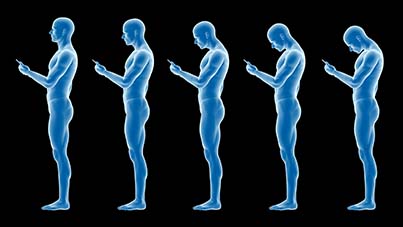
Text neck describes a repetitive stress injury or overuse syndrome in the neck, caused by prolonged use of mobile devices with the head bent downward and not moving. Also called tech neck, text neck is commonly associated with texting, but it can be related to many activities performed on phones and tablets while looking downward, such as surfing the web, playing games, or doing work.
The weight of the head is a key factor for text neck pain. The neck’s muscles, tendons, and ligaments are meant to support the head’s weight—10 to 12 pounds—in a neutral position balanced atop the cervical spine. When texting on a phone, it is common to bend the head forward and look down at a 45- or 60-degree angle, which places about 50 to 60 pounds of force on the neck.1 The neck is not able to withstand this amount of pressure over a prolonged period.

Unique Risks of Smartphones and Tablets to Stress the Neck
- Severe neck angle to view the screen. Compared to TVs and personal computers, smartphone and tablet screens are more commonly viewed while flat on a table or lap, which means the screen angle is more severe. As such, the neck and head are typically bent further forward to view smartphones than other screens.
- Touchscreen element may bring shoulders and head further forward. Research in the journal Ergonomics found that study participants had more forward head posture while texting compared to other smartphone tasks, such as web browsing or watching a video. One possible reason may be that texting is more likely to involve the use of both hands as well as more time with the fingers touching the screen, which is more likely to require the shoulders to round forward even further.
Text neck typically begins as a relatively mild ache in the neck or upper back. It could also present with sharp pain or stiffness in the neck. When text neck is suspected of causing pain, it is typically treated with a combination of:
- Limiting phone/tablet use to necessary tasks
- Using better posture by holding devices up closer to eye level
- Performing exercises and stretches that specifically target the neck, chest, and upper back
If not addressed, the continued forward head posture and hunched shoulders may worsen over time, which could lead to even more pain and reduced mobility in the neck, upper back, and shoulders.
Contact Michigan Pain Consultants Today
If you feel like you are having unrelenting issues caused by posture due to the use of your mobile devices, contact the professionals at Michigan Pain Consultant’s for an evaluation and possible treatment options.
Make an appointment for a new patient consultation with one of our board-certified pain physicians. All of Michigan Pain Consultant’s physicians are Board Certified in Anesthesiology or Physical Medicine & Rehabilitation and have advanced training and experience in Pain Medicine. You can begin first by visiting online at MyLifeBeyondPain.com, MichiganPain.com, or by calling them at (800)281-3237. Michigan Pain Consultants – Better Treatments. Better Life.
With six locations throughout West Michigan, Michigan Pain Consultants comprehensive interdisciplinary approach to pain care offers patients and providers renewed hope for relief from chronic pain. Chronic pain should be treated like other chronic medical conditions such as diabetes, asthma, or congestive heart failure. Chronic pain requires chronic treatment. The goal of the treatment is to optimize the management of the pain, as opposed to curing the pain.
